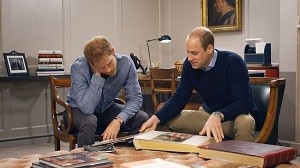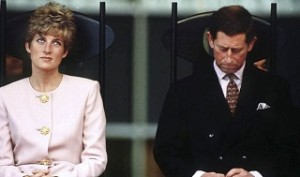A storm in a tea cup?
Today a brief comment upon the current media furore arising in advance of the forthcoming Channel Four programme alleged to feature taped conversations between Diana, Princess of Wales, and her voice coach Peter Settelen.
As I awoke overnight I happened to catch a phone-in section of the Stephen Nolan Show on Radio Five Live in which the above was the subject of debate. As far as I could tell, the copyright ownership of the tapes was not an issue – Nolan mentioned that a court had formally decided they belonged to Settelen.
 On the issue of ‘public interest’, however, Noland then sought to make a distinction between these Diana Tapes and the infamous episode during the 2010 General Election campaign in which Gordon Brown had a slight confrontation with a lady in the street and then – having reached the sanctuary of his official car – expressed his exasperation at “that bigoted woman”.
On the issue of ‘public interest’, however, Noland then sought to make a distinction between these Diana Tapes and the infamous episode during the 2010 General Election campaign in which Gordon Brown had a slight confrontation with a lady in the street and then – having reached the sanctuary of his official car – expressed his exasperation at “that bigoted woman”.
Nolan said the Brown incident was different because firstly, Brown had cocked up by forgetting that he was still wearing a microphone and secondly, the ‘public interest’ factor was satisfied by the fact he was standing for election.
Hang on, I thought to myself. Diana knew she was being videotaped because it must have been evident there was a video camera in the room – and possibly a cameraman operating it, and a sound man present as well.
And who decides the ‘public interest’ factor? Plainly, there’s a difference between evidence in existence and the circumstances and content being a matter of ‘public interest’ (in a political/national security sense) and what here we might term simply ‘a gossipy, possibly prurient, popular interest’ that we, the general public, might find interesting and fun to know about, but which isn’t strictly of national security/political relevance.
Dismiss me an iconoclast if you wish, but – perhaps taking my cue from Rust colleague Simon Campion-Brown – for me the core issue with the Diana Tapes seems to be that of ‘who controls the news’ … describe it as news management if you will … and here I don’t wish to call in evidence President Trump with his ‘fake news’ and social media obsessions.
Clearly the British Royal Family in a general sense wishes to ‘look forward’ and not raise salacious tittle-tattle from the past. It’s in their interests.
 I’m not so sure that Prince Charles will have been too keen to learn that his sons were producing a carefully-edited and controlled ‘interview and programme’ on the occasion of the twentieth anniversary their mother’s untimely death for primetime ITV transmission.
I’m not so sure that Prince Charles will have been too keen to learn that his sons were producing a carefully-edited and controlled ‘interview and programme’ on the occasion of the twentieth anniversary their mother’s untimely death for primetime ITV transmission.
Clearly their motive was to commemorate their mother and perpetuate the positive aspects of her life and about her celebrity, seeking as they did to remind the nation of her former glories.
 For Charles, however, that would inevitably mean the public also being reminded that he was an unfeeling, self-centred oddball and adulterer who – in the public’s perception – treated Diana appallingly.
For Charles, however, that would inevitably mean the public also being reminded that he was an unfeeling, self-centred oddball and adulterer who – in the public’s perception – treated Diana appallingly.
My point is that the Princes’ ITV programme was a classic example of the Royal Family trying, by ‘managing’ the news, to present itself in a good and positive light.
Of course, in that context, for someone to come out of the woodwork with these Diana Tapes was a desperately unfortunate coincidence. Naturally, the Royals would want to ‘close it down’, prevent it going out if they could – never mind what vulnerable mental state, what stress, what motivations Diana had in mind when allowing her conversations to be recorded – but allowing them to be recorded she did.
Whether she was wise to do this, whether she realised the potential implications at all – whether, disoriented by circumstances, she even gave the issue a single thought is unknown and can only be speculated about.
But, as a famous mid-19th Century editorial in The Times newspaper once said [this is the gist, not an exact quotation]: “News is something that someone, somewhere, doesn‘t want to see in print”.
 That’s the problem with ‘news management’ and the whole world of media manipulation, public relations advisers and press officers. If you’re going to put out to the world a hagiographical piece about the life of someone, beware the possibility that there may be people out there with evidence or opinion to the contrary (whether new or reheated) who may feel justified – in the interests of providing an antidote or ‘balance’ – in giving it an airing.
That’s the problem with ‘news management’ and the whole world of media manipulation, public relations advisers and press officers. If you’re going to put out to the world a hagiographical piece about the life of someone, beware the possibility that there may be people out there with evidence or opinion to the contrary (whether new or reheated) who may feel justified – in the interests of providing an antidote or ‘balance’ – in giving it an airing.
My other comment in passing is that – for the past week – practically every juicy quote from these Diana Tapes has already been publicised around the globe, so what good is taking to the media airwaves to condemn their existence and the fact they’re going to be shown on Channel Four designed to do, exactly?
So far it’s done nothing more than provide the Diana Tapes programme with about £2 millions’ worth of additional free advance publicity.
Unless, of course, someone in power (or an adviser thereto) is panicking that the sight of the hapless Diana actually saying the alleged words – possibly looking gorgeous, vulnerable and doe-eyed at the same time – will simply render the impact of them all the greater.
That’s about all I can imagine, trying to put myself in the place of someone in that position.

